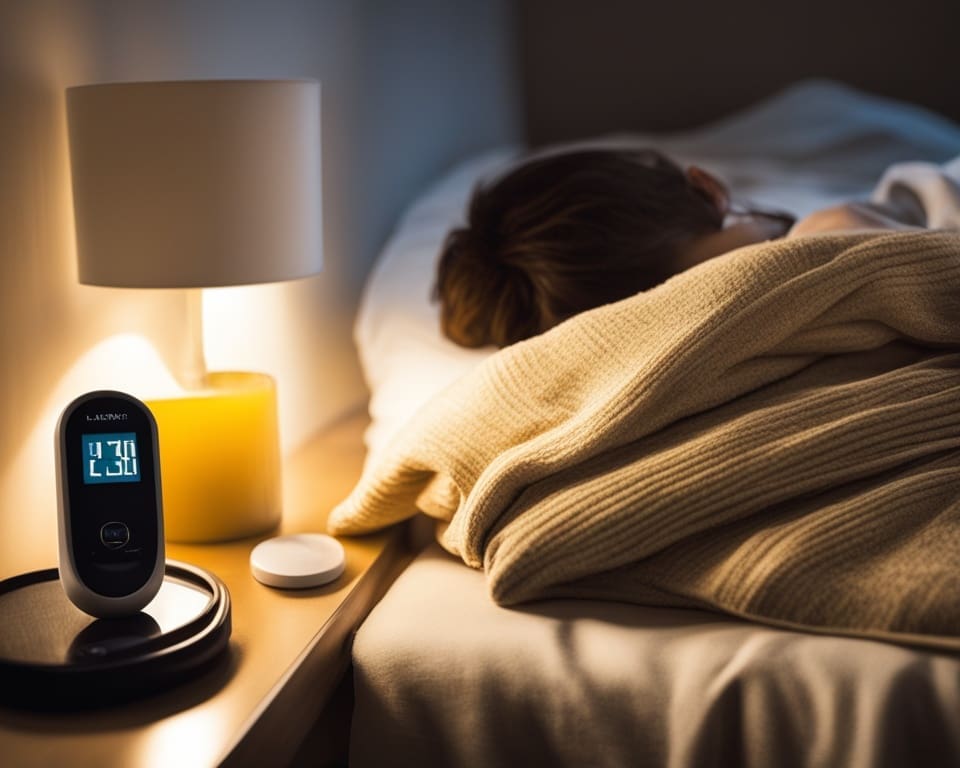For those with type 2 diabetes, getting good sleep is key to staying healthy.1 Many face sleep troubles because their blood sugar isn’t steady.1 When you don’t sleep well, it makes your blood sugar harder to control and can make your body less effective at using insulin. This causes your stress hormone, cortisol, to spike.1 An alarming number of diabetic people sleep too little or too much, which puts them at a higher risk of blood sugar spikes.2 Dr. Gregg Faiman says not getting enough sleep can mess with your blood sugar levels when you have type 2 diabetes. He highlights how important getting good sleep is for managing diabetes.
Key Takeaways
- Getting enough quality sleep helps control type 2 diabetes.
- Poor sleep can make handling blood sugar levels and insulin harder.
- Sleeping too little or too much can be risky if you have type 2 diabetes.
- Good sleep habits and treating sleep problems can help manage diabetes better.
- Quality sleep is essential for good health and feeling well.
Importance of Sleep for Diabetes Management
Good sleep is key for handling type 2 diabetes well. Not getting enough sleep can raise your insulin levels and make your body more resistant to it. It also spikes your fasting glucose, leading to higher blood sugar levels3. Studies show that how much you sleep can affect your diabetes risk. They underscore that getting the right amount of sleep is crucial for managing diabetes4.
Impact of Sleep on Blood Sugar Levels
If you have type 2 diabetes, you might find yourself not sleeping well. This is often due to your blood sugar levels being all over the place3. When your blood sugar is high, you might feel the need to pee more, get more headaches, feel thirstier, and tire easily. These can all mess up your sleep3.
On the other hand, low blood sugar could bring on sweating, irritability, and nightmares. These also mess with your sleep3.
Consequences of Sleep Deprivation
Not getting enough sleep might raise your chance of getting type 2 diabetes. This is true even if you’re not diabetic3. It can also make you gain weight, have high blood pressure, and possibly lose some thinking skills3. The National Sleep Foundation outlines how much sleep we need for good health. They stress the importance of sleeping well for a happy, healthy life4.
When you don’t sleep well, you tend to eat bad and move less. This can up your risk of type 2 diabetes3. Not finding the right balance in sleep time can lead to more health issues like obesity, diabetes, and heart problems. So, sleep plays a critical part in keeping these problems at bay4.
Common Sleep Disorders in People with Diabetes
People with type 2 diabetes often face challenges with sleep. This can affect their health and how they manage diabetes. Three common sleep disorders for them are obstructive sleep apnea, restless legs syndrome, and peripheral neuropathy.
Obstructive Sleep Apnea
Obstructive sleep apnea (OSA) leads to pauses in breathing during sleep. This makes people tired during the day and sleep poorly at night.56A study found many men with type 2 diabetes also had OSA5. Foster et al. reported a link between OSA and obesity in people with diabetes6. Also, OSA can make it harder to control blood sugar levels in those with diabetes5.
Restless Legs Syndrome
Restless legs syndrome (RLS) makes you want to keep moving your legs. This is often because they feel strange, like they’re tingling or crawling. The American Diabetes Association noticed adults with type 2 diabetes also complained of RLS5.6Studies have shown that RLS can make sleep worse for people with diabetes, affecting their overall sleep quality and health6.
Peripheral Neuropathy
Peripheral neuropathy causes nerve damage and can make the arms and legs feel numb, tingle, or hurt. This can make falling asleep or staying asleep tough for those with diabetes. It’s important to treat peripheral neuropathy to prevent long-term nerve damage and sleep issues6.
Help is available for these sleep disorders. Proper medical care and lifestyle changes can make a big difference. They can improve health and help better manage diabetes in people with type 2 diabetes.
Tips for Better Sleep with Diabetes
Sleeping well is key for those with type 2 diabetes. It helps manage blood sugar and keeps you healthy overall.278 Focus on good sleep routines. Dealing with sleep issues can boost your sleep quality. This, in turn, helps control blood sugar better and lowers the chances of diabetes problems.
Prioritize Blood Sugar Management
It’s important to control your blood sugar to prevent sleep disruptions. Highs and lows can both cause problems.2 Using a device to monitor your glucose can be a big help. It lets you track changes and manage your diabetes more effectively.
Practice Good Sleep Hygiene
Try to relax before bed. A soothing routine and a sleep-friendly space can make a huge difference.28 Getting 7 to 9 hours of sleep each night is ideal. Try not to nap too long during the day. Also, keep your bedroom cool, dark, and quiet for the best sleep.
Keep a Regular Bedtime
Going to bed and waking up at the same time daily is more helpful than you might think. It keeps your internal clock steady. This consistency leads to better sleep.2 Studies show that a regular sleep schedule can cut down the time it takes to fall asleep.
Turn Off Electronic Devices
Blue light from phones, TVs, and computers can mess with our sleep. It might cause sleep problems and make insulin resistance worse. To bring down a1c levels and help reverse diabetes, it’s vital to avoid screens for 30 minutes at least, ideally 1-2 hours before sleep.
This blue light stops our body from making melatonin, a sleep hormone. It makes falling and staying asleep hard. Also, it could mess with how our body uses energy, maybe making us gain weight or affecting insulin. That makes managing diabetes harder.

It’s key to keep your room dark and free of electronic light. This can greatly help you sleep better. As a result, your body can heal and recharge which may help lower blood sugar levels.
Research shows not all glucose monitoring systems are equally accurate. It’s crucial to use them right and keep an eye on them to avoid low blood sugar at night.9
Constant screen use makes it tough to relax. This can give you a bad night’s sleep. Setting up a sleep-friendly space and a regular bedtime routine can help a lot. It builds good sleep habits and boosts your health.
| Device | Impact on Sleep |
|---|---|
| Smartphones | Blue light suppresses melatonin production, making it harder to fall asleep |
| Tablets | Constant stimulation and exposure to blue light disrupt sleep patterns |
| Laptops/Computers | Prolonged use before bedtime can interfere with the body’s natural sleep-wake cycle |
| TVs | Bright screens and stimulating content can make it difficult to relax and fall asleep |
Stopping screen time before bed and keeping to a good sleep routine can make a big difference. You’ll sleep better, even with diabetes. This supports your fight to reverse diabetes and keep your blood sugar normal.
Avoid Alcohol Before Bedtime
For people with diabetes, stopping alcohol before sleep is key. It messes with your blood sugar control. This can cause you to have either too low or too high blood sugar10. Also, it acts as a sedative, making your sleep more sporadic and causing you to wake up a lot to use the bathroom10.
Impact of Alcohol on Sleep and Diabetes
Overdoing it with alcohol and diabetes is very risky. It messes up how your body releases glucose, which drops blood sugar levels10. Your body needs about two hours to fully get rid of alcohol. During this time, it might not regulate your blood sugar well10.
The National Sleep Foundation suggests no alcohol for four hours before you sleep10. This advice helps your body process the alcohol before you get in bed. It aims to lessen the chances of your sleep being constantly interrupted and avoid blood sugar ups and downs.
It’s smart to not drink more than 14 units of alcohol a week to keep health risks low. Drinking too much is linked to a higher risk of type 2 diabetes10.
If you take diabetes meds, drinking alcohol can make low blood sugar more likely10. Having alcohol without eating first or drinking a lot, makes this danger worse10. Plus, alcohol is high in calories. This might lead to weight gain, making managing diabetes harder10.
- For those tracking carbs, alcohol can throw off your count10.
- Alcohol impacts fertility and can cause health problems such as high blood pressure, worse neuropathy, bad sleep, cancer, and heart disease10.
If you’re pregnant or trying to have a baby, it’s best not to drink at all. This is especially important in the early months to avoid a higher chance of miscarriage10.
Exercise During the Day
Staying active during the day makes your sleep better at night. This is key for managing diabetes and staying healthy. Just 10 minutes of aerobic exercise can help you sleep better, especially if you have diabetes.
Benefits of Exercise for Sleep
When you exercise, your body heats up. Later, when your temperature drops, it makes you sleepy. This helps you fall asleep easier. Also, exercise lets you burn calories and lose weight. It helps lower blood sugar too, which is vital for people with type 2 diabetes.11
In one study, 61% of people in an active group got rid of diabetes. And 33% had normal blood sugar again after just one year. These people took only two drugs by month 12. In contrast, the others needed about five.11

Research shows that, with the right diet and losing weight, some with type 2 diabetes can even reverse diabetes. In England, nearly half of those overweight with diabetes did so by eating 625-850 calories a day for a few months.12
Doing regular exercise can make you sleep better and help manage diabetes. It aids in weight loss and improves blood sugar control.
Find Ways to De-Stress
Chronic stress can really harm your overall health, especially your sleep.13 For those with diabetes, stress can trigger “diabetes burnout,” making sleep even tougher.13 Adding mindfulness and relaxation to your day can lower stress and improve sleep.
Mindfulness and Relaxation Techniques
Deep breathing, seeing calm scenes in your mind, and meditation work well and bring peace.14 Studies show these activities help cut down on sleep problems and tiredness for adults with insomnia.14
If you can’t sleep for over 20 minutes, it’s better to leave bed and do something relaxing.14 Wait to go back to bed until you feel sleepy again.
Progressive muscle relaxation, in which you tense and relax different muscles, is quite helpful. It lowers anxiety and depression in those with conditions like diabetes.14 One study found it could even lower blood sugar levels if done every other day for 12 weeks in people with type 2 diabetes.14
If stress is too much, don’t be afraid to ask for help from doctors or counselors.14 They can give you tips and tools tailored to you. This can really make a difference, boosting your sleep and well-being.
| Technique | Benefits | Recommendations |
|---|---|---|
| Deep Breathing | Calms the mind and body | Practice for 5-10 minutes daily |
| Visualization | Promotes relaxation and focus | Visualize peaceful scenes or mantras |
| Meditation | Reduces stress and improves sleep | Try guided meditations or apps |
| Progressive Muscle Relaxation | Lowers anxiety and blood sugar levels | Practice every other day for 12 weeks |
Check for Sleep Apnea
Sleep apnea is a common sleep problem for many with type 2 diabetes, affecting about 71% of them15. This is a high percentage when compared to 4-10% in those without diabetes. More than half of those with type 2 diabetes face obstructive sleep apnea15. The National Institutes of Health (NIH) state that around 18 million people have sleep apnea in the U.S., but most cases are not diagnosed16. Specifically, the NIH reports that 12 million Americans have obstructive sleep apnea16.
Symptoms of Sleep Apnea
Knowing the signs of sleep apnea is key for quick diagnosis and treatment. Key symptoms include loud and continuous snoring, feeling very sleepy during the day, being cranky, and morning headaches. If you’re overweight, obese, a smoker, or over 40, you’re more likely to get sleep apnea16.
Treatment Options for Sleep Apnea
A sleep test is a good step if you think you have sleep apnea. Treatments include CPAP machines, which help keep the airway clear, and making lifestyle changes like losing weight16. CPAP therapy has been shown to help with insulin response, cut down on heart disease risks, and impact how your body stores fat, uses muscle, and processes insulin with obstructive sleep apnea17. Also, 59% of diabetic patients found their sugar control improved after using a CPAP machine15.
| Treatment Option | Benefits |
|---|---|
| CPAP (Continuous Positive Airway Pressure) | |
| Lifestyle Changes |
There’s a strong link between insulin resistance, diabetes, and sleep apnea. This shows how vital it is to treat sleep apnea for better diabetes care15. Plus, those with diabetes are twice as likely to get heart disease, which makes getting sleep apnea treatment even more important15.
Manage Restless Legs Syndrome
If you have type 2 diabetes, you might get restless legs syndrome (RLS) more often than others.18 RLS causes feelings like tingles or itchiness in your legs, making it hard to sleep well.18 One out of every five people with type 2 diabetes faces RLS. So, it’s a widespread concern.18
Medications for Restless Legs Syndrome
To ease RLS, different drugs are available for those with diabetes. These include dopamine agents such as pramipexole and ropinirole. They reduce the need to move your legs at night.18 If needed, your doctor might also give you sleeping aids, anticonvulsants, or painkillers. These help lessen the discomfort of RLS and enhance sleep quality.18 Taking iron supplements could be advised if your iron levels are low.18
Handling RLS with the right medication and changes in how you live can help make your sleep better. It might even help prevent reversing diabetes issues. It’s key to talk to your healthcare team. They can help figure out the best way to treat your RLS.18
Treat Peripheral Neuropathy
Peripheral neuropathy is a common problem with diabetes. Up to 50% of those with diabetes can have it. It causes numbness, tingling, and pain in the arms, hands, legs, and feet. This makes it hard to sleep well.19
Medications and Therapies for Peripheral Neuropathy
There’s no cure yet for peripheral neuropathy. But, treatments can help with symptoms and sleep. Pain relievers like aspirin or ibuprofen might work for a short time. For worse pain, doctors often use antidepressants, anticonvulsants, and opioids to help with nerve pain.19 Also, lidocaine injections or creams can numb the skin.
Dealing with peripheral neuropathy is key for better sleep and less nerve damage over time. By lowering blood sugar and managing diabetes well, you might stop more nerve damage. You might even get better from some symptoms.19

Alongside medicines, therapies like transcutaneous electrical nerve stimulation (TENS) can help with pain. The American Academy of Neurology thinks these are good methods. By using different treatments together, people with peripheral neuropathy can sleep better and feel less pain.
Maintain a Healthy Weight
Being at a healthy weight is key to handling reverse diabetes. It also helps with sleep apnea and getting better sleep. A study found that almost half of overweight diabetics reversed their diabetes by eating very few calories for 2-5 months. They ate 625-850 calories a day. Those who lost 30 or more pounds saw the best results.12
Connection Between Obesity, Sleep Apnea, and Diabetes
If you’re obese, you’re more likely to have sleep apnea. This means you might stop breathing at night. It’s because extra fat in the neck can block the airway. Interestingly, over 75% of people with diabetes got better after bariatric surgery. The surgeries that work best over time are gastric bypass and sleeve surgeries.12
Intermittent fasting can also be a good way to tackle type 2 diabetes. This includes eating very little for two days a week or not eating for 24 hours three times a week. These methods have shown good results in weight loss and lowering blood sugar levels.12
| Weight Loss Approach | Diabetes Reversal | Weight Loss |
|---|---|---|
| Very low-calorie diet (625-850 calories/day) | Nearly half of overweight people with diabetes | 30 pounds or more |
| Bariatric surgery | Up to three-quarters of people | Significant weight loss |
| Intermittent fasting (500-600 calories/2 days a week) | Promising results | Promising results |
Staying in shape through eating right and moving often lowers the chance of health problems like sleep apnea. It can also make your sleep better. This way, you can manage and maybe even reverse type 2 diabetes.
Seek Medical Advice
Experiencing sleep problems, fatigue, or signs of diabetes management is serious. It’s critical to speak with your healthcare providers. They can find what’s causing your sleep issues. Together, you can create a plan that fits you.
Importance of Consulting Healthcare Providers
Your healthcare team includes doctors, nurses, and experts like dietitians. They know how to spot why you’re having trouble sleeping. They can help you keep your blood sugar levels right.12 Experts can suggest ways to handle sleep problems like sleep apnea or restless legs. This advice can make you sleep better overall.
Talking with your healthcare team is key. They help you see the link between diabetes and sleep. Working together, you’ll find a way to sleep better and manage diabetes at the same time.
- Talk to your doctor about how you sleep and any worries.
- If you think you have sleep issues, it may be time for tests.
- Listen to what your healthcare provider suggests, whether it’s about changing your lifestyle or your medicines.
Conclusion
Getting enough sufficient, quality sleep is key for those with type 2 diabetes. It helps reverse diabetes and lower blood sugar. To achieve this, it’s important to work on good sleep habits. Also, focus on keeping blood glucose levels in check.
Establishing a regular sleep routine is vital. Techniques like relaxation and keeping a healthy weight are very helpful. Don’t forget to consult a doctor. They can help treat conditions that affect sleep, such as sleep apnea or restless legs. Doing this ensures a better sleep and life for diabetics.2021
By putting importance on sleep and managing diabetes well, life can get better. This approach can lead to a lessening of diabetes effects. It’s possible to even reverse the condition by making lasting lifestyle changes.202122 Making sleep a top priority is vital for better health and tackling diabetes effectively.
FAQ
Why is sleep important for diabetes management?
Good sleep is key for folks with type 2 diabetes. It helps keep blood sugar levels stable. If you don’t sleep enough, or you sleep too much, it can hurt your health.
How can poor sleep affect blood sugar levels?
People with type 2 diabetes often have trouble sleeping. This affects their blood sugar. High blood sugar can cause issues like being very thirsty and tired.
It can be hard to fall asleep if your blood sugar drops too low. This might make you sweat or have bad dreams.
What are the consequences of sleep deprivation for people with diabetes?
Not getting enough sleep can make blood sugar levels high. It can also make you less responsive to insulin. This might put you at risk of getting type 2 diabetes.
Long-term lack of sleep can also cause weight gain and harm your memory.
What are some common sleep disorders in people with type 2 diabetes?
People with type 2 diabetes are more likely to have sleep problems. This can include issues like not breathing well during sleep, restless legs, and nerve problems.
How can I prioritize blood sugar management for better sleep?
To sleep well, keep your blood sugar in check. Use a device to check your sugar levels often. This way, you can avoid big spikes or dips that can disturb your sleep.
What are some good sleep hygiene practices?
Getting 7-9 hours of sleep each night is important. Avoid taking long naps during the day. Before bed, find things that help you relax.
Try to go to bed and wake up at the same time each day. This helps your body know when it’s time to sleep.
How can electronic devices affect sleep and diabetes?
Blue light from phones and screens can mess with your sleep. This light can make your body think it’s daytime. Turn these devices off 30 minutes to 2 hours before you sleep.
How does alcohol consumption affect sleep and diabetes?
Drinking alcohol can be bad for your blood sugar and your sleep. It might wake you up at night to use the bathroom. Stop drinking alcohol four hours before bed to sleep better.
How can exercise benefit sleep for people with diabetes?
Being active during the day can help you sleep better at night. Just 10 minutes of exercise can make a difference. It makes you feel tired later, which helps you fall asleep.
Exercise also burns calories and helps control your blood sugar.
How can mindfulness and relaxation techniques help with sleep?
Practices like deep breathing, imagining peaceful scenes, and meditation can reduce stress. This can make it easier to fall asleep. They’re known to help with sleep issues and tiredness.
What are the symptoms of sleep apnea, and how is it treated?
Signs of sleep apnea include loud snoring and feeling very sleepy during the day. If you think you have it, a sleep test can find out for sure. Treatments include machines that help you breathe better and losing weight.
How is restless legs syndrome treated in people with diabetes?
Doctors may give medicines like dopamine or anticonvulsants for RLS. They could also suggest sleeping pills. If you have low iron, iron supplements might help.
What are the treatment options for peripheral neuropathy affecting sleep?
For nerve pain, you might take aspirin or other painkillers. Antidepressants and certain other drugs can also help. These are important to lessen pain and sleep problems.
How is obesity related to sleep disorders and diabetes?
Being too heavy can make it hard to sleep well. It’s linked to sleep apnea and diabetes. Losing weight through eating well and moving more can make you sleep better.
When should I seek medical advice for sleep problems related to diabetes?
If you’re having trouble sleeping or you often feel tired, talk to your doctor. They can help figure out what’s going on and suggest ways to sleep better.
Source Links
- https://www.sleepfoundation.org/physical-health/lack-of-sleep-and-diabetes
- https://www.everydayhealth.com/hs/type-2-diabetes-care/sleep-better/
- https://www.ncbi.nlm.nih.gov/pmc/articles/PMC10693913/
- https://www.ncbi.nlm.nih.gov/pmc/articles/PMC5070477/
- https://www.ncbi.nlm.nih.gov/pmc/articles/PMC5628550/
- https://www.ncbi.nlm.nih.gov/pmc/articles/PMC4478581/
- https://www.webmd.com/diabetes/type-2-diabetes-sleep
- https://www.healthline.com/health/type-2-diabetes/top-sleep-tips
- https://www.ncbi.nlm.nih.gov/pmc/articles/PMC3869147/
- https://www.diabetes.org.uk/guide-to-diabetes/enjoy-food/what-to-drink-with-diabetes/alcohol-and-diabetes
- https://news.weill.cornell.edu/news/2020/06/diet-and-exercise-treatment-reverses-diabetes-in-61-percent-of-patients
- https://www.webmd.com/diabetes/can-you-reverse-type-2-diabetes
- https://www.diabetes.org.uk/guide-to-diabetes/emotions/stress
- https://www.everydayhealth.com/hs/type-2-diabetes-management/reduce-stress/
- https://www.sleepcycle.com/sleep-apnea/sleep-apnea-and-diabetes/
- https://health.clevelandclinic.org/sleep-apnea-can-make-managing-diabetes-more-difficult-what-you-need-to-know
- https://www.ncbi.nlm.nih.gov/pmc/articles/PMC6123041/
- https://www.ncbi.nlm.nih.gov/pmc/articles/PMC7418840/
- https://www.medicalnewstoday.com/articles/317923
- https://www.medicalnewstoday.com/articles/327390
- https://www.ncbi.nlm.nih.gov/pmc/articles/PMC6520897/
- https://www.ncbi.nlm.nih.gov/pmc/articles/PMC9206440/





